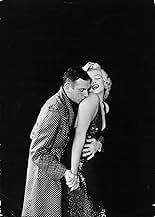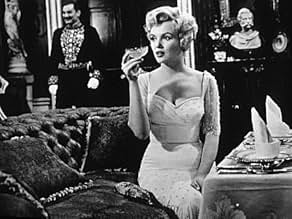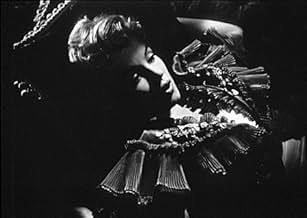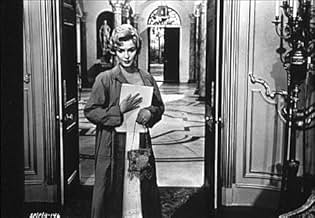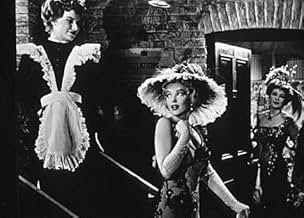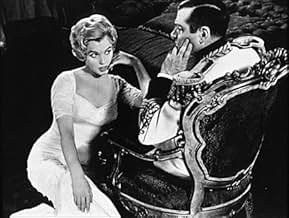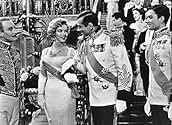IMDb-BEWERTUNG
6,4/10
9546
IHRE BEWERTUNG
Ein amerikanisches Showgirl verstrickt sich in politische Intrigen, als der Prinzregent eines fremden Landes versucht, sie zu verführen.Ein amerikanisches Showgirl verstrickt sich in politische Intrigen, als der Prinzregent eines fremden Landes versucht, sie zu verführen.Ein amerikanisches Showgirl verstrickt sich in politische Intrigen, als der Prinzregent eines fremden Landes versucht, sie zu verführen.
- Nominiert für 5 BAFTA Awards
- 2 Gewinne & 6 Nominierungen insgesamt
Andreas Malandrinos
- Valet with Violin
- (as Andrea Melandrinos)
Empfohlene Bewertungen
This is one of those movies where the set pace of events are known to the audience, so that when it reaches it's conclusion we are aware that what we (the audience) might wish can happen for the two leads is not going to be possible.
It is 1911, and we are in London for the coronation week of King George V and his wife Queen Mary. If you have read THE GUNS OF AUGUST by Barbara Tuchman, this event was the last great occasion for the appearance of all the crowned heads of Europe prior to the destruction (in seven years) of three leading houses (Hohenzollern, Romanov, and Hapsburg) due to World War II. Despite the survival of several other monarchies in Scandanavia, the Benelux countries, and (in revival) in Spain, the three lost ones of 1918 are now joined by the lost ones of the Balkans. And it is the Balkans that is the spot that Laurence Olivier's Carpathia is located in.
In reality Carpathia is part of Hungary and Roumania. Part of it (Transylvania) is well known through the story of Dracula. But for the sake of this story, it is an independent kingdom like Roumania, Bulgaria, and Serbia at that time. Prince Charles, the Regent of Carpathia, is running the country until his son King Nicholas comes of age in 18 months. So sometime in 1913 Nicholas will start ruling in his own name, and he is pro-German. Charles is pro-English. This would be unimportant but Carpathia has the fourth best army in Europe, so if it shifts it's position it may cause an unbalanced international situation that may lead to a general war.
Charles (Laurence Olivier) and Nicholas (Jeremy Spenser) and Nicholas' grandmother the Queen Dowager (Sybil Thorndike) are attending it. Charles is being monitored by Foreign Office official Northbrook (Richard Wattis), who wants to make sure the Regent is happy on his visit. Charles attends a show, and decides that one of the minor actresses, Elsie Mariner (Marilyn Monroe) should be invited to the Carpathian Embassy for a late supper. Despite misgivings Northbrook arranges for Elsie to show up.
But Elsie (although welcomed by the amorous Charles) finds she has to watch as he spends time talking about a political problem at home - the capture of one of Nicholas' clique of pro-German friends who has been caught with some compromising documents that would hurt the King. Charles plans to squeeze the arrested man for all the information he can get about Nicholas' schemes, but admits to his telephone informant that he is more likely to have problems about the situation from President Taft and his meddlesome Americans than from anyone else. Elsie, who overhears this, is angered (she is an American). The result is a moment that most fans of Monroe don't recall. They remember that she sang Happy Birthday to President Kennedy once, but here she toasted President William Howard Taft with champagne.
Charles finds Elsie not like other women he has had one night stands with. First, he never gets to first base with her (she gets drunk and falls asleep, despite his varied attempts to get her into the right mood and position). Second, she does not leave as he hopes, but keeps getting stuck deeper and deeper into the embassy and the Royal Family's world (even attending the coronation at Westminster Abbey). She is there for the embassy ball, and she even has a second night where she is in control of the trysting. Charles married his late wife and did his duty for her and her country, but he finds he loves Elsie. But he is leaving at the start of the third day for Carpathia with his mother and son, and has another 18 months of duty before he is free. And Elsie has 18 months left to her play contract. They do say "au revoir" at the end, but will they get back together. For they can't until 1913, the start of the Second Balkan War, and one of the steps that brought World War I to fruition.
The film was based on a play, THE SLEEPING PRINCE by Terence Rattigan, one of the best dramatists of England in the 20th Century (THE WINSLOW BOY, THE BROWNING VERSION). A practitioner of what Shaw called "the well-made play", Rattigan made sure his plays were entertaining and intelligent, and his characters were realistic. But in the original play Elsie was not American, but English, and was played by Vivien Leigh. Olivier had thought of filming the play with Leigh, but her illness interfered. Monroe was available, and was big box-office. Olivier was to direct her, his first film direction assignment since RICHARD III. She gave so much difficulty to him, he did not direct another film until 1970 when he did Checkov's THE THREE SISTERS.
But the film has it's period charms and a literate script. It does capture the brittle social and diplomatic world of 1911 quite well. Olivier's Regent is not as great a part as Richard III or Hamlet or Othello, but he does have a grasp on the man's pride and sense of self-importance. Monroe does come across as intelligent regarding family matters (i.e. the Regent and his son, the King), as well as an understanding woman. Wattis shoulders the dignity of the foreign office ruffled by the crazy duties he has to shoulder that week. Sybil Thorndike, with her fears of anarchists, and belief that Elsie is a close friend of Sarah Bernhart, is in a peculiar portion of the universe. She carries off an eccentric royal type that is light years away from her aged, vicious crone in BRITTANIA MEWS. It was not a major film - certainly not in the same category as the three Olivier Shakespeare films, but it is a good minor one.
It is 1911, and we are in London for the coronation week of King George V and his wife Queen Mary. If you have read THE GUNS OF AUGUST by Barbara Tuchman, this event was the last great occasion for the appearance of all the crowned heads of Europe prior to the destruction (in seven years) of three leading houses (Hohenzollern, Romanov, and Hapsburg) due to World War II. Despite the survival of several other monarchies in Scandanavia, the Benelux countries, and (in revival) in Spain, the three lost ones of 1918 are now joined by the lost ones of the Balkans. And it is the Balkans that is the spot that Laurence Olivier's Carpathia is located in.
In reality Carpathia is part of Hungary and Roumania. Part of it (Transylvania) is well known through the story of Dracula. But for the sake of this story, it is an independent kingdom like Roumania, Bulgaria, and Serbia at that time. Prince Charles, the Regent of Carpathia, is running the country until his son King Nicholas comes of age in 18 months. So sometime in 1913 Nicholas will start ruling in his own name, and he is pro-German. Charles is pro-English. This would be unimportant but Carpathia has the fourth best army in Europe, so if it shifts it's position it may cause an unbalanced international situation that may lead to a general war.
Charles (Laurence Olivier) and Nicholas (Jeremy Spenser) and Nicholas' grandmother the Queen Dowager (Sybil Thorndike) are attending it. Charles is being monitored by Foreign Office official Northbrook (Richard Wattis), who wants to make sure the Regent is happy on his visit. Charles attends a show, and decides that one of the minor actresses, Elsie Mariner (Marilyn Monroe) should be invited to the Carpathian Embassy for a late supper. Despite misgivings Northbrook arranges for Elsie to show up.
But Elsie (although welcomed by the amorous Charles) finds she has to watch as he spends time talking about a political problem at home - the capture of one of Nicholas' clique of pro-German friends who has been caught with some compromising documents that would hurt the King. Charles plans to squeeze the arrested man for all the information he can get about Nicholas' schemes, but admits to his telephone informant that he is more likely to have problems about the situation from President Taft and his meddlesome Americans than from anyone else. Elsie, who overhears this, is angered (she is an American). The result is a moment that most fans of Monroe don't recall. They remember that she sang Happy Birthday to President Kennedy once, but here she toasted President William Howard Taft with champagne.
Charles finds Elsie not like other women he has had one night stands with. First, he never gets to first base with her (she gets drunk and falls asleep, despite his varied attempts to get her into the right mood and position). Second, she does not leave as he hopes, but keeps getting stuck deeper and deeper into the embassy and the Royal Family's world (even attending the coronation at Westminster Abbey). She is there for the embassy ball, and she even has a second night where she is in control of the trysting. Charles married his late wife and did his duty for her and her country, but he finds he loves Elsie. But he is leaving at the start of the third day for Carpathia with his mother and son, and has another 18 months of duty before he is free. And Elsie has 18 months left to her play contract. They do say "au revoir" at the end, but will they get back together. For they can't until 1913, the start of the Second Balkan War, and one of the steps that brought World War I to fruition.
The film was based on a play, THE SLEEPING PRINCE by Terence Rattigan, one of the best dramatists of England in the 20th Century (THE WINSLOW BOY, THE BROWNING VERSION). A practitioner of what Shaw called "the well-made play", Rattigan made sure his plays were entertaining and intelligent, and his characters were realistic. But in the original play Elsie was not American, but English, and was played by Vivien Leigh. Olivier had thought of filming the play with Leigh, but her illness interfered. Monroe was available, and was big box-office. Olivier was to direct her, his first film direction assignment since RICHARD III. She gave so much difficulty to him, he did not direct another film until 1970 when he did Checkov's THE THREE SISTERS.
But the film has it's period charms and a literate script. It does capture the brittle social and diplomatic world of 1911 quite well. Olivier's Regent is not as great a part as Richard III or Hamlet or Othello, but he does have a grasp on the man's pride and sense of self-importance. Monroe does come across as intelligent regarding family matters (i.e. the Regent and his son, the King), as well as an understanding woman. Wattis shoulders the dignity of the foreign office ruffled by the crazy duties he has to shoulder that week. Sybil Thorndike, with her fears of anarchists, and belief that Elsie is a close friend of Sarah Bernhart, is in a peculiar portion of the universe. She carries off an eccentric royal type that is light years away from her aged, vicious crone in BRITTANIA MEWS. It was not a major film - certainly not in the same category as the three Olivier Shakespeare films, but it is a good minor one.
The title of this film might well be "Watch Marilyn seduce Laurence Olivier". Marilyn had an amazing, nearly unique, quality of "sex appeal". Not that other actresses aren't beautiful or sexy, but Marilyn stands alone, as the greatest screen goddess. The way she moved, the way she talked, it's almost unbelievable how appealing she was. This movie seems designed to show off her abilities in this regard. As such, it is a movie that is worth watching, assuming that you are interested in watching a woman seducing a man.
In other respects, the movie is not a great film. The plot has almost no drama to it. The comedy is so "genteel" as to hardly merit a polite chuckle. Sir Laurence is fine as the stiff, un-romantic prince who tries to avoid falling for Marilyn's charms but there is little "fire" to his performance.
Ultimately the movie rests on Marilyn's remarkable talent for being "desirable". I rate this film just behind "The Seven Year Itch" but it does feature more screen time for Marilyn.
BTW: I see some real resemblance between MM in this film and Jessica Lange (circa "Tootsie").
In other respects, the movie is not a great film. The plot has almost no drama to it. The comedy is so "genteel" as to hardly merit a polite chuckle. Sir Laurence is fine as the stiff, un-romantic prince who tries to avoid falling for Marilyn's charms but there is little "fire" to his performance.
Ultimately the movie rests on Marilyn's remarkable talent for being "desirable". I rate this film just behind "The Seven Year Itch" but it does feature more screen time for Marilyn.
BTW: I see some real resemblance between MM in this film and Jessica Lange (circa "Tootsie").
Just saw this again the other day after many years, and was impressed by Monroe's effortless upstaging of Olivier, who gives the most hammy, artificial performance of his career, unsurprising as he is directing himself.
If you want to see what star quality means, just watch their scenes together. He is desperately trying to ACT and eclipse her. All she has to do is just BE there in shot.
Whenever they are on screen, it is always her that one's eyes are drawn to and she gives such a natural performance throughout it almost seems as if she isn't acting at all. She also copes with some extremely tricky dialogue, giving the lie to her inability to remember lines. These are often done in a single take - one scene in particular, early in the film as she is leaving the house before Olivier arrives home, talking rapidly to Richard Wattis as they walk down the long staircase, is outstanding.
So, the film is worthwhile in showing Monroe as the great star she was - and revealing Olivier to only be capable of mere caricature (that fake German accent is so awful) without a strong director to rein him in.
If you want to see what star quality means, just watch their scenes together. He is desperately trying to ACT and eclipse her. All she has to do is just BE there in shot.
Whenever they are on screen, it is always her that one's eyes are drawn to and she gives such a natural performance throughout it almost seems as if she isn't acting at all. She also copes with some extremely tricky dialogue, giving the lie to her inability to remember lines. These are often done in a single take - one scene in particular, early in the film as she is leaving the house before Olivier arrives home, talking rapidly to Richard Wattis as they walk down the long staircase, is outstanding.
So, the film is worthwhile in showing Monroe as the great star she was - and revealing Olivier to only be capable of mere caricature (that fake German accent is so awful) without a strong director to rein him in.
If this movie would have been like its first 40 minutes, now we'd been talking about a masterpiece. Unfortunately, after the initial fireworks due to the perfect duet between an extraordinary actor as Laurence Olivier and the magnificent Marilyn Monroe, the movie loses its push, maybe because the story doesn't know where to go. Actually the movie is good only when there's Olivier and Marilyn together in a room: the rest is really pointless. It's a pity because the scenography, the music, the acting and the direction of Olivier were good. A lost opportunity.
If you are a Monroe fan you are in for an hour-and-a-half of sheer enjoyment watching the ingenuous, irrepressible, sexy/innocent personality that Marilyn played so well. It's hard to take your eyes off her as feelings,thoughts,and reactions to events flow over her features in a feast of method acting, if that's what it is. The little story is entertaining in a shallow sort of way - there's something going on with mitteleuropa politics and family tensions but it hardly matters as the engine of the story is the wide-eyed little commoner dumped into an aristocratic environment, and everything that transpires in the short time-frame of her visit. The joke there is that she is always being farewelled but doesn't quite go, and reappears, always in the same dress. There's a fairly familiar thread contrasting sophisticated and corrupt Europe with the honest, down-to-earth representative of the New World. However the European side does provide the excuse for some great costumes and sumptuous interiors, making the film glamorous to watch. Laurence Olivier is reptilian and repulsive as the Grand Duke, which is fine except that we are supposed to believe that the Monroe character has fallen for him. This is not too credible! The direction is tight and effective, so kudos to Olivier for that. Sybil Thorndike is great fun as the Dowager Queen. It's Monroe's film however. I'd happily watch it any number of times.
Wusstest du schon
- WissenswertesMarilyn Monroe and Sir Laurence Olivier had trouble filming together. He would often get angry at her forgetting lines or being late to the set. Monroe was furious one day while filming, when Laurence told her to "just be sexy".
- PatzerNorthbrook refers to the foxtrot, a dance that didn't premiere until 1914, three years later.
- Zitate
Elsie Marina: Yes, I speak German. I was born in Milwaukee.
- VerbindungenFeatured in ABC Stage 67: The Legend of Marilyn Monroe (1966)
- SoundtracksThe Duke of York
(uncredited)
Traditional
Arranged by Cecil H. Jaeger
Top-Auswahl
Melde dich zum Bewerten an und greife auf die Watchlist für personalisierte Empfehlungen zu.
Details
- Erscheinungsdatum
- Herkunftsländer
- Sprachen
- Auch bekannt als
- The Prince and the Showgirl
- Drehorte
- Produktionsfirmen
- Weitere beteiligte Unternehmen bei IMDbPro anzeigen
Box Office
- Weltweiter Bruttoertrag
- 8.437 $
- Laufzeit1 Stunde 55 Minuten
Zu dieser Seite beitragen
Bearbeitung vorschlagen oder fehlenden Inhalt hinzufügen

Oberste Lücke
By what name was Der Prinz und die Tänzerin (1957) officially released in India in English?
Antwort

